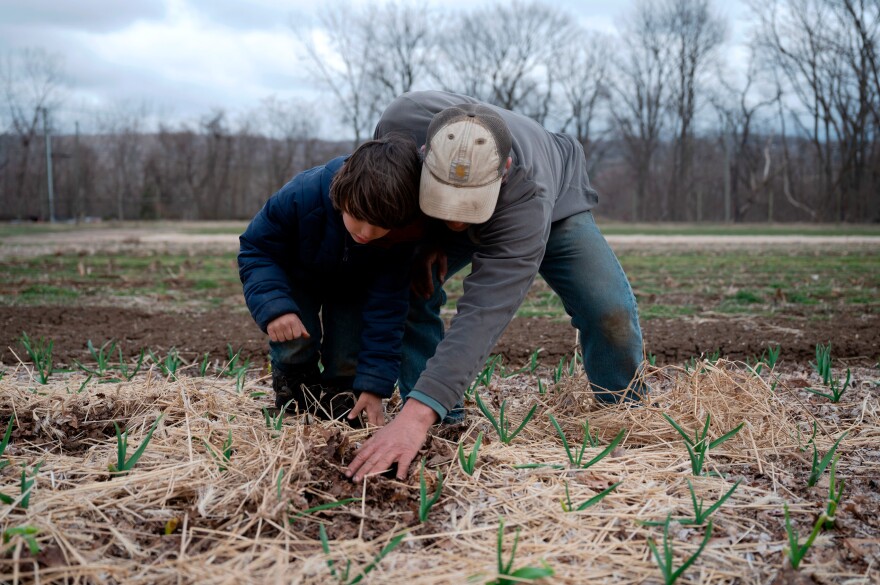Spring is here, and with it the growing season for Connecticut farms. As a part of the essential supply chain, they’re subject to far fewer restrictions than many other businesses, but life on the farm during coronavirusis still complicated and uncertain.
We depend on your support. Donate to Connecticut Public today.
“It’s not a great time mentally because it’s a very stressful time for farmers,” said Kerry Taylor, who runs Provider Farm in Salem with her husband, Max. “We’re already in kind of a limbo between the end of winter and a lot of preseason jitters, so it’s a lot to absorb.”
Taylor said that for the moment, she will continue with early-season plans, like a spring plant sale she holds every year for home growers, because she believes gardens will be more important than ever this year.
“It’s the one time in my life that I feel like I chose the right career,” she said. “I’m sequestered at home -- no problem! I don't have to go out in the world, and I'm essential, I can stay open.”
Whether customers will still come to small farms, and how their other distribution lines will stay open, is a more complicated question.
Paul Bucciaglia and his partner, Rebecca Batchie, run Fort Hill Farm in New Milford. For them, there are no losses yet, but they are bracing.
“The average small business, farm or otherwise, has a pretty limited capital reserve, so I don’t know what’ll happen beyond a couple weeks of this for many people,” Bucciaglia said. “I think for us, we’re good until, I'd say, mid-May. And then it’ll start impacting us really hard.”
Fifty percent of Fort Hill’s income is from farmers markets. Forty percent comes from customers buying shares in their Community Supported Agriculture plan, or CSA. Bucciaglia has no idea how the CSA may run this year -- what adaptations they’ll have to make for social distancing or whether customers will feel safe returning.

The day he spoke with Connecticut Public, Bucciaglia looked through the mail, hopeful for checks from customers securing a CSA share. But all he found were bills.
Sellers who wanted to secure their spot at the Coventry Farmers Market -- the largest in Connecticut and one of the largest in New England -- already had their applications submitted a month ago, before COVID-19 started changing everything. That’s up to 60 vendors, including food trucks.
Market Master Erica Pagliuco said her priority is to protect those vendors from uncertain times.
“We’re not requiring any vendor fees for the foreseeable future, because we’re not exactly sure what will happen come opening day, which is the first Sunday in June,” she said.
The Connecticut Department of Agriculture has issued new guidelines for farmers markets, saying vendors’ booths should be spaced 6 feet apart. Pagliuco said that may lead to questions about how many of the 20 to 50 typical guest vendors she’ll accept as the season goes on, and how to deal with any additional restrictions on how many people would be allowed to gather.
“If that were to come into play, and we were limited on what we could have for a quote-unquote ‘occupancy’ in a field, which we don’t normally have an occupancy, how do we find that middle ground between protecting the public, also getting great local produce to shoppers?” she asked.
For Agriculture Commissioner Bryan Hurlburt, a lot of those new guidelines are about common sense safety measures.
“Prepackage materials so consumers aren’t touching the produce, have hand-washing stations or hand sanitizer available for people as they’re there, wipe everything down before you start and after you finish at the market, so you’re not bringing anything from one market to the next place or back to your farm,” he urged organizers.
Hurlburt acknowledges there is nervousness in the industry about the future during coronavirus -- he’s been holding virtual town halls with growers to talk through their anxieties. And he’s also been talking to federal officials about how small agriculture could fit into the national supply chain as the pandemic develops.
“I’ve been in close contact with our congressional delegation, with folks down at USDA, we have regular calls with the secretary about what would need to be done and how we could essentially create a workaround solution, or ensure that folks are getting access to food and that the supply chain is still working to the best extent possible,” Hurlburt said.
But he also sees this as a potential opportunity for the industry to showcase itself as a resource for people who now have to stay closer to home.

“We have a very robust greenhouse industry,” he said. “So if you’re staying at home and you want to get out of the house and do some planting, you can visit your local greenhouse, garden center or nursery. Buy some Connecticut-grown products, get in the backyard, get some fresh air and take advantage of this time that otherwise is a challenge to get through.”
That’s exactly the right sentiment for Charlotte Ross. Ross, and her husband, Jonathan Janeway, run Sweet Acre Farm in Lebanon, where they’ve farmed for nine years. She said for her, local agriculture feels more important than ever, and she’s choosing to remain hopeful.
“Farmers are very used to pivoting in the face of obstacles, and so that gives me a little bit of good faith in our local food community and producers that we will, once again, face this big change efficiently and quickly,” she said.
And she urges people who are struggling in the crisis to think about turning to local resources like the state’s own agricultural sector.
“Find your local farmers, and let us know how we can best help you, let us know where you need us to show up, because we are here growing food, and we want to get it into your hands, and we don’t want distribution or finances to be an obstacle,” Ross said. “We want to feed you.”






